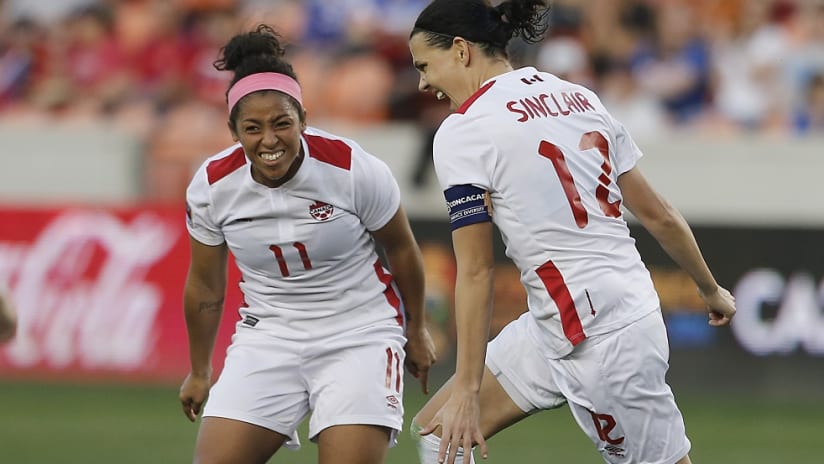The most surprising moment of Canada’s medal-winning journey through the Rio Olympics didn’t come in 415204843" tabindex="0">Friday’s match for bronze.
While the Canadians had to contend with a boisterous, sold-out crowd at Arena Corinthians, beating Brazil was always a possibility given the historical parity between the two teams. In 20 all-time matches, Canada and Brazil have now scored seven wins each (though Friday’s 2-1 victory was Canada’s first on Brazilian soil in seven attempts).
But no, winning 415204845" tabindex="0">on Friday wasn’t the most eye-opening moment of these Summer Games.
It also wasn’t Janine Beckie’s record-breaking goal, just 19 seconds into the tournament opener against Australia. The quickness of the goal was an unexpected thrill, but Beckie’s capacity to finish surprised no one who’s followed the team over the last 12 months.
The big surprise wasn’t the thin statistical margin of their 3-1 win over No. 93-ranked Zimbabwe. Canada thoroughly dominated the first half before powering down in the second stanza, conceding late after an anomalous bout of miscommunication at the back.
Nor was it their defeat of the favored French in the quarterfinals. If anything, it was one of the most familiar feelings of the competition since it came four years after Canada similarly withstood France’s consistent attack to emerge with a 1-0 win at the Olympics.
The biggest surprise of the tournament wasn’t even Canada’s first-ever win over Germany, a 2-1 result in the group-stage finale that – as far as the tournament bracket went – neither side was especially motivated to come out on top of.
It was an extraordinarily gratifying result, to be sure, but the Canadians have demonstrated in the past (specifically, the 2011 Women’s World Cup) that though results against Germany had heretofore eluded them, hanging around with the two-time World Cup champs wasn’t entirely beyond their means.
No, the most surprising moment came in the 73rd minute of the game against Australia, with Canada hanging onto a 1-0 lead after having gone down to 10 players since an early red card to Shelina Zadorsky.
Canada were awarded a penalty kick, a crucial opportunity to kill off the opponent in what was always going to be the most important game of the group stage. And of course, of course – as sure as death and taxes – it was going to be long-time captain Christine Sinclair stepping up to take it.
Sinclair, at that moment, had 163 international goals in her career, including 10 from the penalty spot. Sinclair was the player who, more so than any other one in Canadian history, could be counted upon to deliver in key moments.
Surely she would score the penalty and seal the win. Except, she didn’t step up to the spot.
It was the 21-year-old Olympic debutante Beckie who took that responsibility, with Canada’s fate in the entire tournament potentially resting on her foot.
She missed.
But things would not unravel from there. Sinclair ended up making Beckie’s miss a moot point a few minutes later, scoring her 164th goal for Canada.
For someone chasing the all-time goal-scoring record in international soccer, a penalty kick would be a prime opportunity to pad that stat. But Sinclair, the consummate leader, declined that opportunity as she, instead, gave her blessing to the emboldened youngster.
Sinclair went on to score her 165th career goal in the bronze-medal match with another game-winning goal in her illustrious national-team career. And as she broke down in tears at game’s end, Canadian fans couldn’t help but wonder whether they were seeing Sinclair in her final big tournament for the national team.
She turned 33 in June. She’ll be 36 during the next Women’s World Cup, and 37 during the next Olympic Games.
That’s pushing it for any player to compete at the international level, despite repeated claims from head coach John Herdman that he’d like to have Sinclair as part of the squad for France 2019.
There’s a new generation of offensive talent rising for Canada, including Beckie and 17-year-old Deanne Rose, who had a standout performance in Friday’s showdown. So while the void left by Sinclair’s eventual retirement will likely be impossible to completely fill, the cupboard is far from bare when it comes to the Canadian attack.
But for all the words that have been spilled, and will continue to be spilled about Sinclair’s future, her actions have continued to drown them out.
For years, Sinclair has adapted to a shifting role within the Canadian lineup, which has allowed newcomers to make their way into the team and benefit from her wisdom, leadership and playmaking ability.
Sinclair and Beckie were tied for the team lead in goals at these Olympics with three apiece, but the captain’s deference to the youngster on that penalty kick is a loud-and-clear demonstration that Sinclair doesn’t put the team’s goals behind her own.
For that reason alone – to say nothing of her positive ongoing influence on the likes of Beckie, Rose and Nichelle Prince – Sinclair deserves to lead this team for as long as her body will allow her.
Surely, everyone in Canada will be begging the soccer gods to allow Sinclair one more chance to win a gold medal for her country. And at this moment, no one who has watched her remarkable career unfold would dare bet against it.














